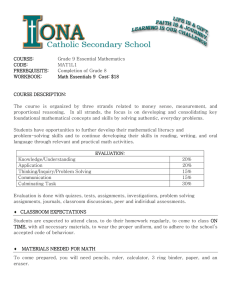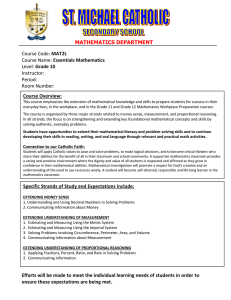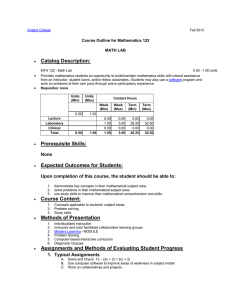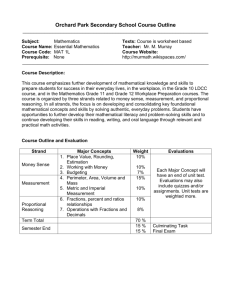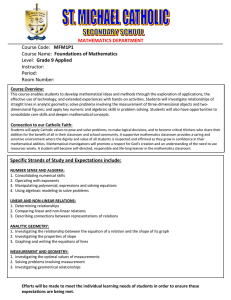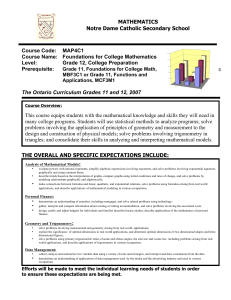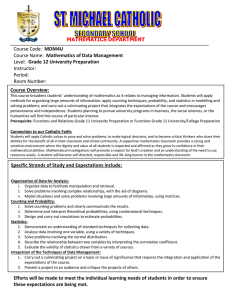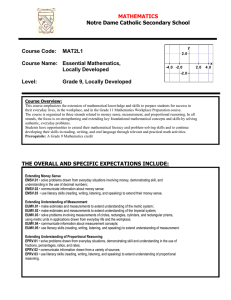MAT1L Essentials Mathematics Grade 9
advertisement
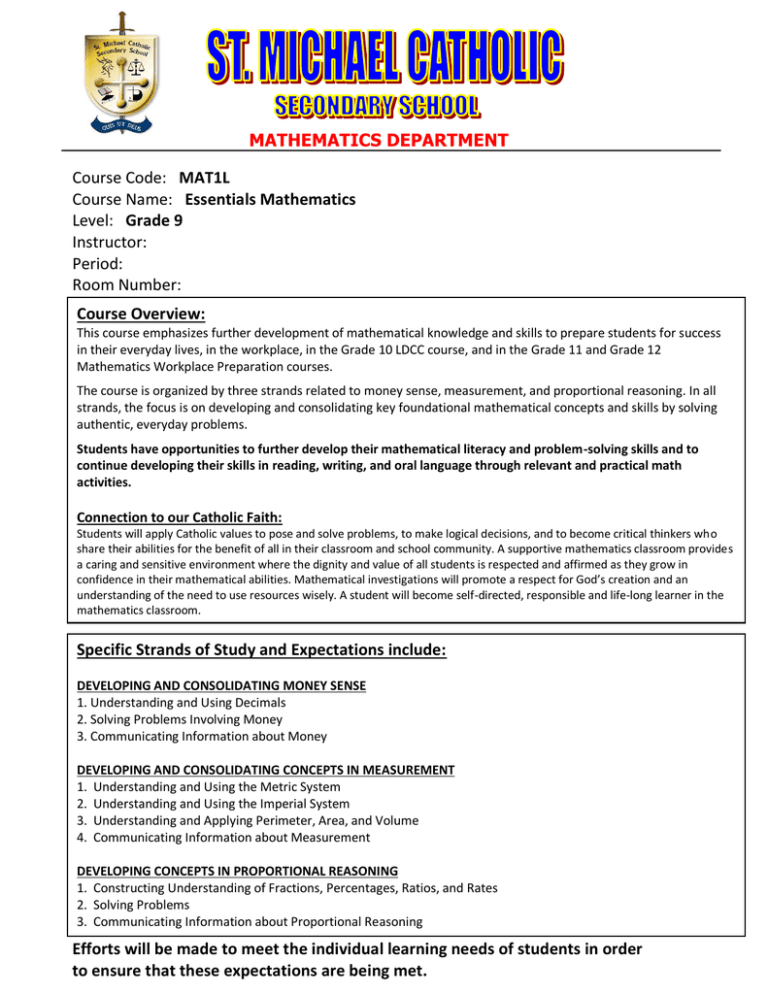
MATHEMATICS DEPARTMENT Course Code: MAT1L Course Name: Essentials Mathematics Level: Grade 9 Instructor: Period: Room Number: Course Overview: This course emphasizes further development of mathematical knowledge and skills to prepare students for success in their everyday lives, in the workplace, in the Grade 10 LDCC course, and in the Grade 11 and Grade 12 Mathematics Workplace Preparation courses. The course is organized by three strands related to money sense, measurement, and proportional reasoning. In all strands, the focus is on developing and consolidating key foundational mathematical concepts and skills by solving authentic, everyday problems. Students have opportunities to further develop their mathematical literacy and problem-solving skills and to continue developing their skills in reading, writing, and oral language through relevant and practical math activities. Connection to our Catholic Faith: Students will apply Catholic values to pose and solve problems, to make logical decisions, and to become critical thinkers who share their abilities for the benefit of all in their classroom and school community. A supportive mathematics classroom provides a caring and sensitive environment where the dignity and value of all students is respected and affirmed as they grow in confidence in their mathematical abilities. Mathematical investigations will promote a respect for God’s creation and an understanding of the need to use resources wisely. A student will become self-directed, responsible and life-long learner in the mathematics classroom. Specific Strands of Study and Expectations include: DEVELOPING AND CONSOLIDATING MONEY SENSE 1. Understanding and Using Decimals 2. Solving Problems Involving Money 3. Communicating Information about Money DEVELOPING AND CONSOLIDATING CONCEPTS IN MEASUREMENT 1. Understanding and Using the Metric System 2. Understanding and Using the Imperial System 3. Understanding and Applying Perimeter, Area, and Volume 4. Communicating Information about Measurement DEVELOPING CONCEPTS IN PROPORTIONAL REASONING 1. Constructing Understanding of Fractions, Percentages, Ratios, and Rates 2. Solving Problems 3. Communicating Information about Proportional Reasoning Efforts will be made to meet the individual learning needs of students in order to ensure that these expectations are being met. Course Breakdown Resources: The course will use a variety of resources including Unit 1: Money Matters (Place Value and Rounding) Unit 2: Linear Measurement: Metric Unit 3: Linear Measurement: Imperial Unit 4: Cooking (Ratio/Fractions) Unit 5: Sports and Leisure (Ratio/Imperial) Unit 6: Dining Out (Estimating) Unit 7: Home Improvement (Metric) Unit 8: Healthy Choices (Ratio) Unit 9: Boxed In (Volume) Unit 10: The World of Work (Money) SMARTBOARD technology, video, Internet Applications, math software, and a variety of print sources. The student workbook, Math Essentials 9 will be distributed to students during the first week of the course. The workbook assigned to students is the responsibility of the student. Any damage incurred will result in payment for replacement. ($20.00) Evaluation Structure: Knowledge/Understanding 30% Application 30 % Communication 20 % Thinking/Inquiry 20 % The above is reflected in the term work (worth 70% of the final mark) and the summative work (worth 30% of the final mark). Evaluation Policy: Students will be assessed & evaluated according to the work produced & skills displayed. Methods of providing feedback will include assessing work in process & evaluating completed assignments, tests, co-operative learning activities, simulations and presentations. Peer & self-evaluations will also be utilized. Student marks will be determined by evaluating process & product according to 4 categories & 4 levels. Please see the chart below for specific skills and key words used to determine student competency in the different categories. Level Level 1: Level 2: Level 3: Level 4: Category 50-59% 60-69% 70-79% 80-100% Knowledge/Understanding -Limited -Some success -Considerable -Thorough display of in displaying display of understanding of Knowledge of facts & terms knowledge, knowledge, knowledge skills concepts and ability Understanding of concepts & relationships skills and skills and and ability to apply to communicate, Thinking/Inquiry ability to apply application of concepts think creatively and Critical thinking skills concepts concepts apply concepts Creative thinking skills Inquiry Skills Communication Communication of ideas and information Use of symbols & visuals Oral & written communication Application Applications in familiar contexts Transfer of concepts to new contexts Making logical conclusions and predictions Use of technology Making connections Feedback will also be provided for student learning skills. Skills such as responsibility, organization, independent work, collaboration, initiative and self regulation are assessed independently student achievement and will be conducted through the use of a rubric indicating specific criteria to be achieved to receive each of the following letter grades: E –Excellent G – Good S – Satisfactory N - Needs Improvement Other Evaluation Issues LATE ASSIGNMENTS. Assignments submitted after the Primary Due Date established by the teacher will be accepted with a penalty of 5% off for the first day late and 2% for subsequent days to a maximum of 10%. This four day Penalty Zone is the maximum time allowed for submissions. The fourth day after the assignment is due is considered the Closure Date upon which no further assignments will be accepted. If the teacher returns the marked assignments within the four day penalty zone, the date of return is considered the closure date. Repeated lateness in submissions indicates poor organization skills and will result in parental contact and will be reflected in the learning skills section of the report card. INCOMPLETE ASSSIGNMENTS Assignments will be graded according to the extent with which they meet the criteria established in the rubric or evaluation structure. MISSED TESTS Tests missed with a legitimate reason will be written within a few days of the student returning from the absence. Student eligibility to write the test and the date of writing will be at the discretion of the teacher in consultation with the department head. CULMINATING ACTIVITIES These activities will be due toward the end of the course. They are valued between 5 and 15 per cent of the final mark and will reflect course material and competencies not otherwise reflected on the final exam. Plagiarism in any form reflects academic dishonesty and will result in a mark of zero for the assignment in question
